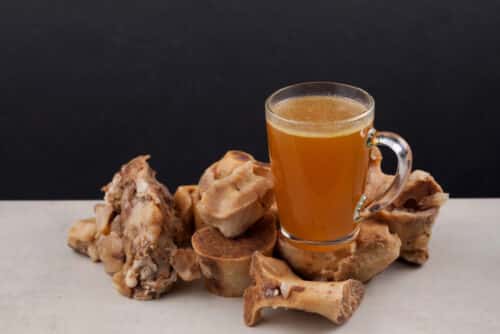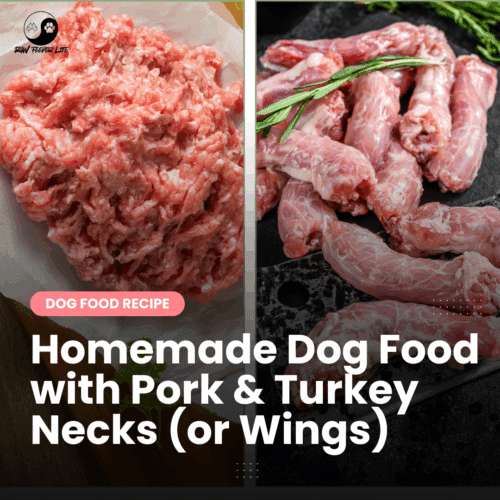Keep the Tail Wagging is supported by pet parents. I occasionally earn a commission (at no additional cost to you) when you click through an affiliate link to one of my favorite products. Thank you for your support. Read More
The topic of bone broth came up in a raw feeding group and within that discussion, someone mentioned that they make mushroom broth for their dogs. What? Mushroom broth? That's a thing?
Yep, it's a thing.
The idea of feeding mushrooms to dogs is as hard to accept as adding garlic to their diet. We've been told for years that these things are toxic, but as raw feeders, we're learning that those lists of toxic foods shared on social media aren't quite accurate. So now I'm learning to ask more questions.
Benefits of Mushrooms for Dogs
In my research, I learned that several medicinal mushrooms help boost the immune system and protect dogs from cancer and shrink the size of tumors. So, to me, it's a no-brainer that mushrooms should be a part of my dogs' diet:
- Reishi – cancer, allergies, heart disease, and arthritis
- Shiitake – allergies, Cushing's disease, cardiovascular health, incontinence, and digestive health
- Turkey Tail – cancer, digestive issues, arthritis
- Chaga – anti-inflammatory, cancer, immune system
I've added mushrooms to their diet occasionally, but I haven't been consistent until now. Before researching the health benefits of mushrooms, I would add Shiitake mushrooms (and a few others) to their bone broth from time to time (sauteed or roasted to activate the benefits). I always add them to their vegetable mix.
In this post, I will explore how to add mushrooms without adding a ton of extra work to feeding my dogs.
Nutrients in Shiitake Mushrooms
Shiitake mushrooms are loaded with nutrients; the most notable of which are fiber, copper, and Vitamin B5 (pantothenic acid).
- Fiber supports gut health. #HealthGutHealthyDog
- Copper helps dogs form connective tissues and collagen.
- Vitamin B5 helps the system digest macronutrients while improving stamina.
Raising dogs with a history of gut and joint issues made Shiitake appealing.
How to Add Shiitake Mushrooms to a Dog's Diet
I primarily buy shiitake mushrooms from a local grocery store, finely dice the mushrooms finely and either sautee or roast them for approximately 15 minutes (to disrupt the cellular wall) before adding them to a meal. I don't focus on a “dosage” for my dogs; instead, I occasionally feed two or three tablespoons of the mushrooms as a side dish.
Shiitake Supplements for Dogs
I haven't found a shiitake supplement (dried mushroom powder) for my dogs, but it is an ingredient in several products I trust:
Raw Vibrance by Dr. Harvey's
Shiitake mushrooms are one of the many ingredients in the base mix Raw Vibrance. This is the easiest way to introduce this mushroom to a raw food diet, especially if you're new to raw feeding. I love to add Raw Vibrance to my dogs' diet and alternate this base mix with DIY and some premade raw brands. A base mix is the easiest way to formulate a nutritionally complete raw diet for my dogs.
How Often I Add Medicinal Mushrooms to My Dogs' Diet
I add shiitake mushrooms to my dogs' bone broth and vegetable mix. It's too expensive to add shiitake mushrooms to my dogs' diet daily, and I don't have access to the many other mushrooms that are beneficial to dogs. Therefore, I alternate between supplements from the following brands:
- Real Mushrooms – Daily Dawg 5 Defenders, Immune Chews, Turkey Tail, Cordyceps, Lion's Mane
- Animal Essentials – Mushroom Defense, Lion's Mane, Cordyceps
With my dogs getting older and the rising rate of canine cancer, I want to make sure I support their immune system, and I believe that consciously adding medicinal mushrooms to their diet will give them more protection against cancer and other health issues.
Possible Side Effects of Shiitake Mushrooms
It's tempting to run off and start adding mushrooms to your dog's diet, especially when you learn about the cancer-fighting benefits. But it's important to know the possible side effects. For example, Chaga mushrooms are natural blood thinners and shouldn't be fed to dogs diagnosed with hemangiosarcoma unless one knows how to balance the diet with a bleeding cancer.
In my reading, I couldn't find any devastating side effects of shiitake mushrooms or any warnings for pet parents. Instead, I learned that the following side effects of consuming shiitake mushrooms exist for humans:
- some people get contact dermatitis from handling shiitake mushrooms; this hasn't been my experience, but it's a possibility
- long term use of a powder supplement can result in digestive upset and other gastrointestinal issues
- some people quickly learn that they have a mushroom sensitivity (allergy)
- long term consumption of shiitake mushrooms increases the production of one type of white blood cells in response to gastrointestinal issues mentioned above
Because of the risks, I feel more comfortable giving my dogs veterinarian-approved supplements rather than mixing up a supplement on my own.
Resources About Feeding Mushrooms to Dogs
I'm not a veterinarian or an animal nutritionist. If you'd like to learn more about the benefits of mushrooms for dogs, you can check out the following articles:
- The Many Health Benefits of Mushrooms (And How to Add Them To Your Pet’s Diet) [contains recipes]
- Are Medicinal Mushrooms Good for Dogs, Cats, Horses
and other Pets? - Medicinal Mushrooms For Dogs: Multi-Dimensional Healing
- How Shiitake Mushroom Strengthens Pet Immune Systems







Hey, Kim – After reading about Raw Vibrance on your blog, I sent off for the sample, used it, and liked it, but I’m not much for mystery foods. Since you’re now into nutritional spreadsheets, I wonder if you have the necessary info on Raw Vibrance.
Because after trying the sample, I emailed Dr. Harvey’s with two questions: (1) could I use phytoplankton instead of oil, and (2) would they give me a nutritional breakdown of the kind you find for foods on say the nutritiondata site.
As to phytoplankton, the answer I got was unbelievably strange – yes I could use it, just add 5 TABLESPOONS in place of the recommended oil. (Yes, that’s what it said. I still have the email.) To be fair, that came from an intermediary, not Dr. Harvey, and I turned down the opportunity to talk to him directly via phone because my hearing is bad, and in spite of hearing aids, I don’t hear well over the phone.
Then I got a promise to get back to me with the nutrition data. Maybe that will still happen, but it’s been more than a month and nothing. I’m pretty disappointed because I liked the stuff. It would be very expensive for my large dog, but I was thinking of using it at least part of the time because it would be so very convenient. It’s hard to believe the info is a state secret, and since they aren’t saying if fed per instructions RV meets AAFCO or NRC standards, surely they must realize at least some customers would like to know what they’re feeding.
All of which is to say, I wonder if you have some in with the company that could get better answers out of them.